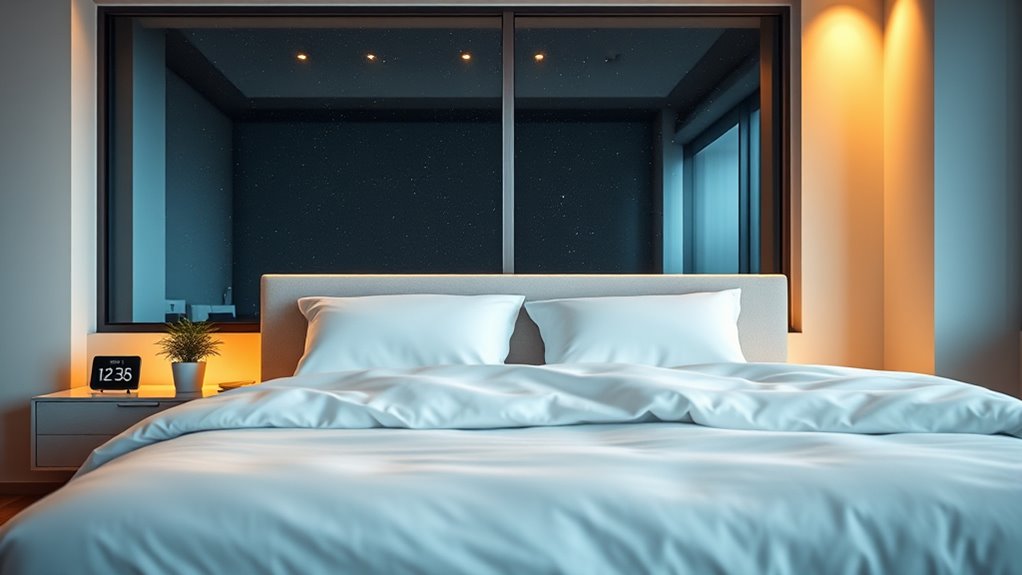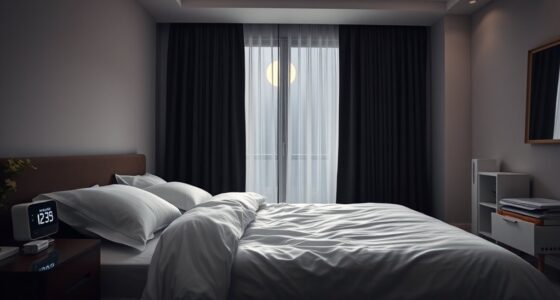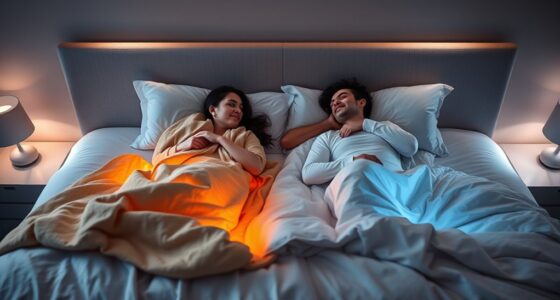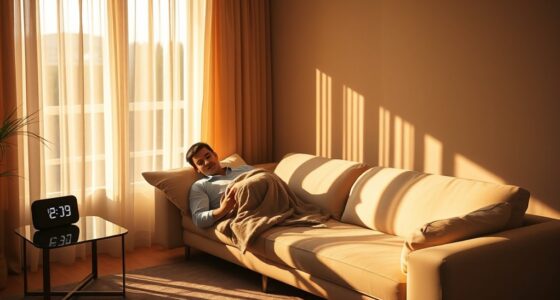Many bedtime “rules” are actually myths. You don’t need to go to bed at the same time every night, as your circadian rhythm can adjust. Avoiding screens before bed isn’t a strict requirement—limiting blue light helps, but relaxation matters most. Drinking alcohol before sleep disrupts it, and long daytime naps can harm nighttime rest. You don’t need exactly 8 hours, and complete darkness isn’t always best. Keep these misconceptions in mind and discover smarter sleep tips ahead.
Key Takeaways
- Strictly going to bed at the same time every night isn’t necessary; overall consistency in sleep patterns is more important.
- Complete darkness isn’t always better; balanced lighting can promote relaxation and comfort before sleep.
- Drinking alcohol may help you fall asleep initially but impairs overall sleep quality and restorative cycles.
- Napping late or for too long can disrupt nighttime sleep, so short, earlier power naps are preferable.
- Rigid 8-hour sleep goals aren’t essential; feeling rested and alert during the day indicates sufficient sleep for your needs.
The Need to Sleep at the Same Time Every Night

Many believe you must go to bed at the same time every night to maintain healthy sleep, but this isn’t entirely true. Your circadian rhythm, the internal clock that regulates sleep-wake cycles, isn’t fixed to a strict schedule. While consistency helps, it’s more important to prioritize regular sleep patterns overall. If your schedule varies, your body can adjust, especially if you maintain similar sleep and wake times each day. Sleep consistency supports better sleep quality by reinforcing your circadian rhythm, making it easier to fall asleep and wake up refreshed. The key isn’t rigid adherence to a specific bedtime but rather establishing a routine that aligns with your natural biological rhythms and allows for enough sleep each night. Maintaining flexibility in your sleep schedule can help accommodate life’s unpredictability without compromising overall sleep health.
Avoiding Screen Time Before Bed Guarantees Better Sleep

While maintaining a consistent sleep schedule is helpful, what you do right before bed can impact how well you sleep. Avoiding screen time doesn’t automatically guarantee better sleep, but it can reduce screen fatigue and lessen your device dependency. Using screens before bed exposes you to blue light, which can suppress melatonin production, making it harder to fall asleep. Even if you don’t notice immediate effects, regular exposure can disrupt your sleep cycle over time. Reducing screen use at least 30 minutes before bed helps your body prepare for rest naturally. By limiting your device use, you allow your brain to wind down without overstimulation, leading to more restful sleep. Cutting back on screens isn’t a guarantee, but it’s a proven way to improve your sleep quality. Sleep hygiene practices further support healthy sleep habits and overall well-being.
Drinking Alcohol Before Bed Helps You Sleep More Soundly
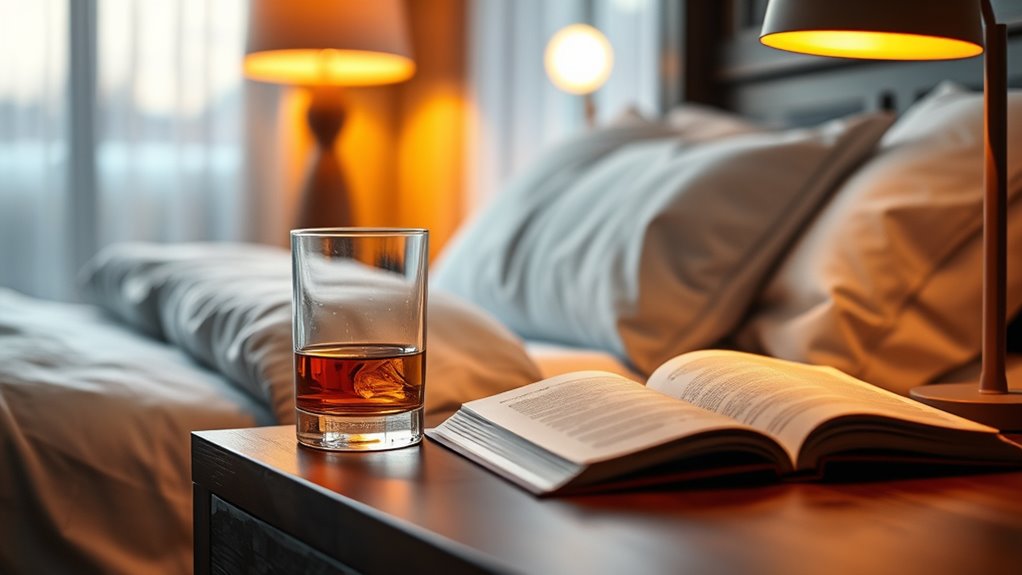
Some people believe that drinking alcohol before bed can help them sleep more soundly, but this idea is misleading. While alcohol may initially promote relaxation, it actually harms sleep quality. Alcohol relaxes your muscles and may make you feel sleepy faster, but it disrupts your sleep cycle later in the night. This interruption reduces the restorative benefits of deep sleep and can lead to more awakenings. Drinking alcohol before bed might seem like a quick fix for insomnia, but it ultimately decreases your overall sleep quality. Instead of helping, alcohol relaxation can create fragmented sleep, leaving you tired and less refreshed in the morning. For better sleep, focus on healthier habits that support genuine relaxation without compromising sleep quality. Incorporating sleep-friendly habits such as maintaining a consistent schedule and avoiding screen time before bed can significantly improve your sleep quality.
Napping During the Day Ruins Your Nighttime Sleep
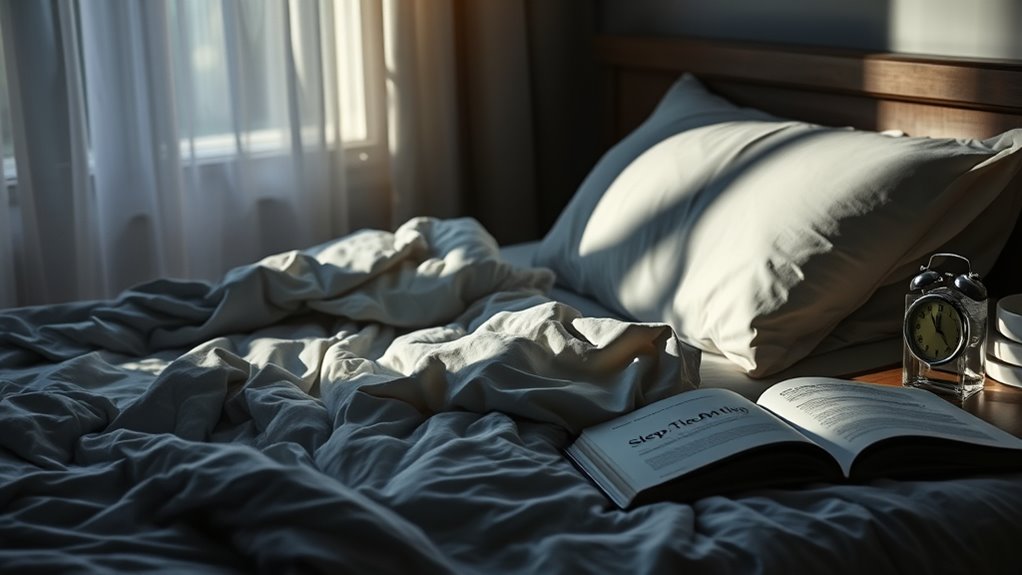
Taking long or late naps during the day can interfere with your ability to fall asleep at night. While power naps can boost alertness temporarily, lengthy or late naps often disrupt your sleep cycle, making it harder to get quality rest. Instead of relying on sleep aids or napping excessively, try to keep naps short—around 20 minutes—earlier in the day. Here’s how naps can impact you:
| Power Naps | Sleep Disruptors |
|---|---|
| Boost alertness | Delay sleep onset |
| Improve mood | Fragment nighttime sleep |
| Quick energy | Reduce overall sleep quality |
| Short duration | Increase nighttime wakefulness |
| Easy to do | Can lead to dependence on aids |
Additionally, oversteeping green tea can make it taste bitter and affect your overall tea experience.
You Must Sleep for Exactly 8 Hours to Feel Rested
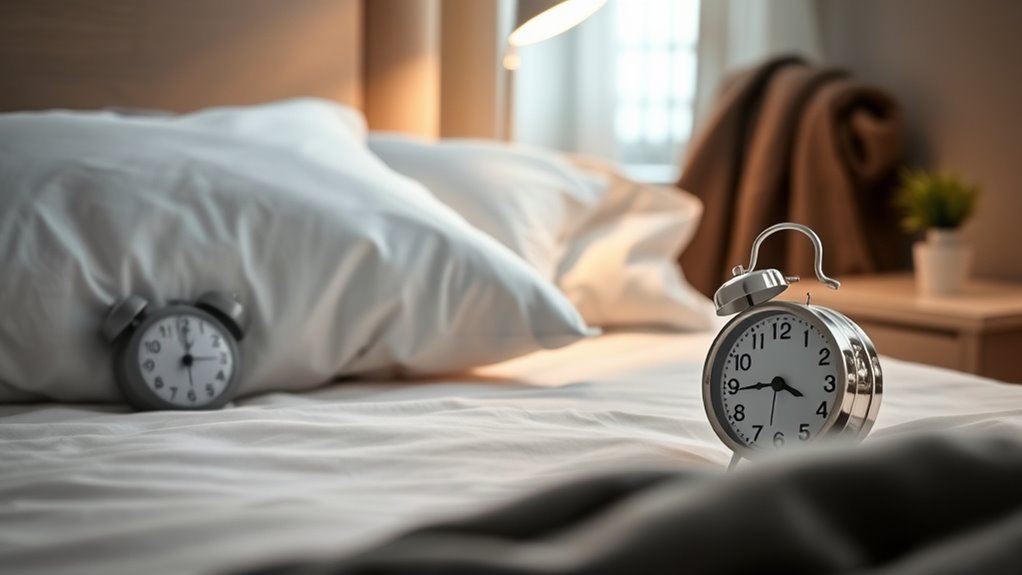
Many people believe you need exactly eight hours of sleep to feel rested, but the truth is more flexible. Sleep duration varies from person to person, and what matters most is the quality of your rest. Some may feel refreshed after six hours, while others need closer to nine. Focusing solely on a specific number can lead to frustration and unnecessary concern. Instead, pay attention to how rested you feel during the day. Rest quality depends on how well your sleep cycles are completed, not just how long you sleep. If you wake up feeling alert and energized, your sleep duration is likely appropriate for you. Remember, the key isn’t a fixed number but rather feeling rested and functional throughout your day. Understanding sleep needs can help you tailor your sleep habits to suit your individual requirements.
Bedtime Rituals Like Reading or Meditation Are Essential for Good Sleep
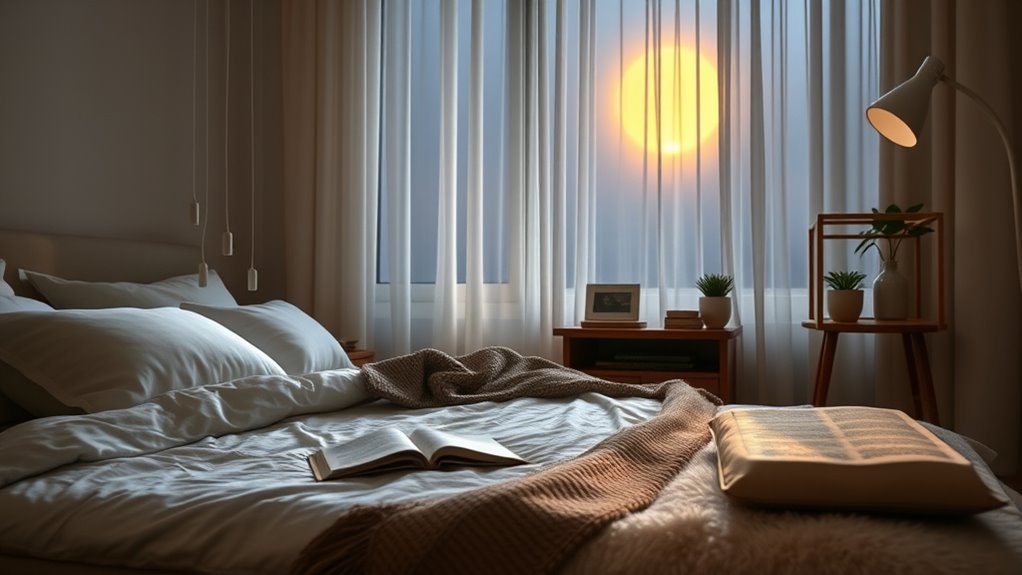
While the length of your sleep matters less than its quality, establishing a calming bedtime routine can markedly improve how well you rest. Incorporate relaxing activities to signal your body that it’s time to wind down. For example:
- Read a soothing bedtime story to relax your mind.
- Practice meditation or deep breathing exercises to reduce stress.
- Use calming scents like lavender to create a peaceful environment.
- Turn off screens at least 30 minutes before bed to minimize blue light exposure.
- Incorporating relaxation techniques that reduce stress can further enhance sleep quality.
These rituals help your brain associate certain cues with sleep, making it easier to drift off. Consistently practicing them can improve sleep quality, helping you wake up refreshed and alert. Remember, it’s the calming, consistent routine that counts.
Sleeping in on the Weekends Will Disrupt Your Sleep Schedule

Sleeping in on the weekends might seem harmless, but it can actually throw off your sleep schedule. When you indulge in weekend sleep ins, you disrupt your body’s internal clock, making it harder to wake up naturally during the week. This shift can lead to a mismatch between your sleep and wake times, causing grogginess and reduced sleep quality. While catching up on sleep is tempting, consistently altering your sleep schedule on weekends prevents your body from establishing a steady routine. Instead, aim to wake up at roughly the same time each day, even on weekends. This consistency helps regulate your circadian rhythm, improves overall sleep quality, and makes mornings easier. Remember, maintaining a regular sleep schedule benefits you far more than sporadic weekend sleep ins. Sleep consistency is key to staying energized and alert throughout the day.
The Darkest Bedroom Is Always the Best for Sleep
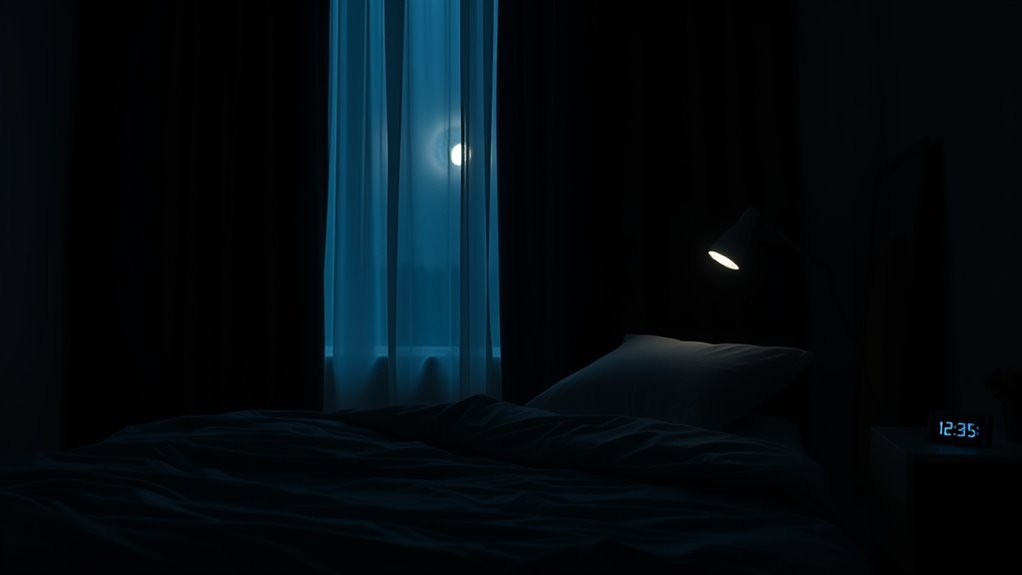
Although darkness can promote better sleep, the idea that the darkest bedroom is always the best isn’t entirely accurate. Excessive light exposure before sleep can disrupt your circadian rhythm, but complete darkness isn’t necessary for everyone. The ideal sleep environment balances light and comfort. Sustainable choices in bedroom lighting, such as energy-efficient bulbs or smart lighting systems, can reduce environmental impact while creating a cozy atmosphere. Imagine your bedroom: 1. Dim, soft lighting in the evening helps signal your body to wind down. 2. A cool room temperature around 60-67°F (15-19°C) supports restful sleep. 3. Light-blocking curtains reduce unwanted light exposure without making the room pitch black. 4. Avoiding overly dark environments can prevent feelings of isolation or discomfort, helping you relax. Finding the right balance improves sleep quality more than just eliminating all light.
Frequently Asked Questions
Can Sleep Needs Vary Significantly Between Individuals?
You might wonder if sleep needs differ greatly between people. The answer is yes, personal sleep differences are common, and genetic influences play a big role. Some individuals require more sleep to feel rested, while others function well with less. Your body’s unique makeup determines this, so comparing yourself to others isn’t helpful. Paying attention to how you feel during the day is the best way to understand your ideal sleep amount.
Is It True That Warm Milk Helps You Fall Asleep?
Ever wonder if warm milk truly helps you fall asleep? Many believe in dairy myths, but science shows that bedtime beverages like warm milk may have a mild effect, thanks to tryptophan. While it’s not a guaranteed sleep aid, sipping warm milk can be comforting and may promote relaxation. Don’t rely solely on it—focus on good sleep habits, but enjoy your bedtime beverage as a soothing ritual.
Do Certain Foods or Drinks Affect Sleep Quality?
Certain foods and drinks can influence your sleep quality, so choose wisely. Sleep inducing snacks like almonds or bananas may help you relax and reduce dream distraction. Avoid caffeine or heavy meals before bed, as they can disrupt your sleep cycle. Instead, opt for light, sleep-friendly options to enhance your rest. Remember, your diet plays a key role in how well you sleep through the night.
How Does Stress Impact Sleep Patterns?
Stress can seriously disrupt your sleep patterns by increasing cortisol levels, which make it harder to fall asleep and stay asleep. To improve your sleep, focus on stress reduction techniques like deep breathing or meditation. When you lower stress, your cortisol levels decrease, helping your body relax and signaling that it’s time to rest. Managing stress isn’t just good for your mind but also essential for a good night’s sleep.
Are There Specific Sleep Positions That Are Healthier?
You might wonder if certain sleep positions are healthier. Your sleep posture can impact comfort and spinal alignment, so find a position that keeps your neck and back supported. A medium-firm mattress often helps maintain proper posture, reducing strain. Sleeping on your side or back generally promotes better health than stomach sleeping. Adjust your mattress firmness and sleep position to improve overall sleep quality and prevent discomfort.
Conclusion
Forget the old rules and tune into your body’s natural rhythm. Sleep isn’t a strict blueprint but a gentle dance with your unique needs. Think of your sleep schedule as a river that flows freely, not a rigid canal. Embrace flexibility, let go of myths, and trust your body’s signals. When you listen closely, you’ll find that peaceful, restorative sleep is less about perfection and more about harmony with yourself.
